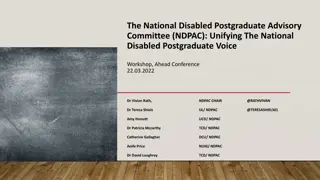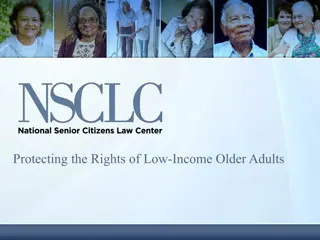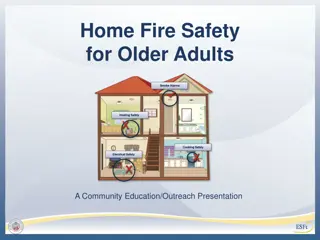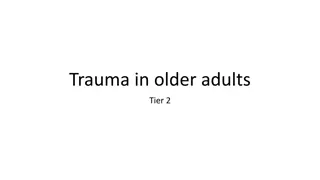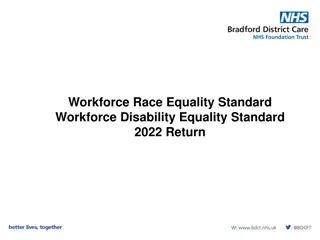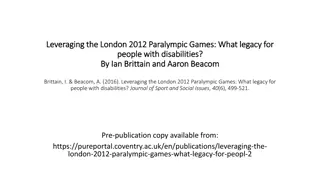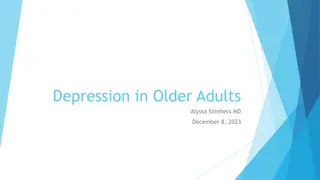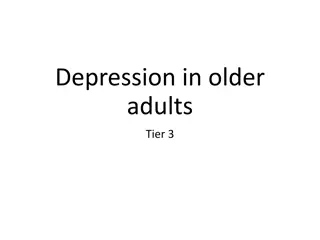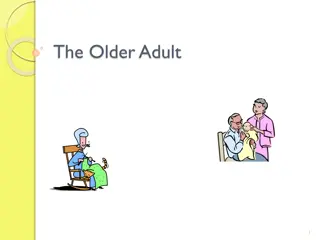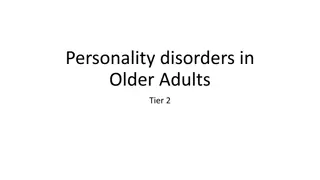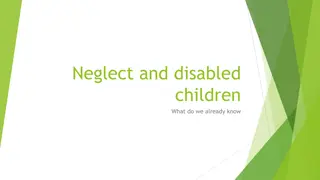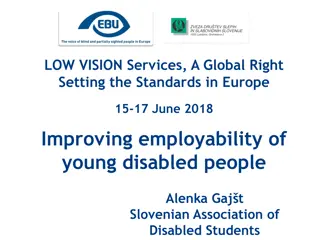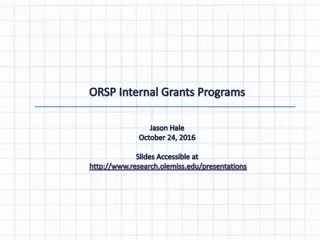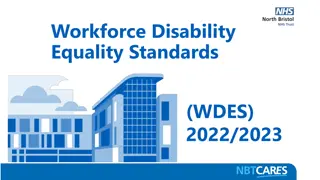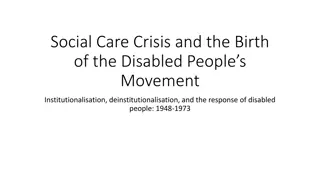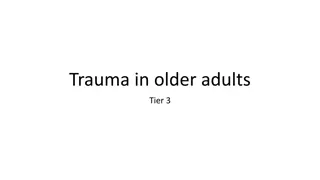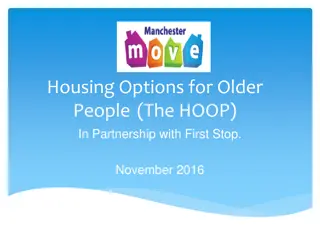Supporting Independent Living for Older Adults Through Disabled Facilities Grants
The National Body for Home Improvement Agencies is focusing on enhancing the delivery of Disabled Facilities Grants to support older individuals like Joyce, who face challenges in maintaining their homes due to age-related issues. With a growing number of households led by individuals aged 85 and over, it is crucial to address accessibility needs in mainstream housing. Increased funding and policy frameworks are aimed at promoting prevention, early intervention, and integrated services to improve overall well-being and independence for older adults.
Download Presentation

Please find below an Image/Link to download the presentation.
The content on the website is provided AS IS for your information and personal use only. It may not be sold, licensed, or shared on other websites without obtaining consent from the author. Download presentation by click this link. If you encounter any issues during the download, it is possible that the publisher has removed the file from their server.
E N D
Presentation Transcript
Disabled Facilities Grants - where have we come from? - where are we going? National Body for Home Improvement Agencies Improving Delivery of the Disabled Facilities Grant
What shall we do about Joyce? Home owner 90 years lives alone minor stroke
Homes headed by someone aged 85 and over are the fastest growing household* By 2025 there are projected to be 1.5 million households headed by someone aged 85 or over an increase of 54% from 2015* 3 *Source: Ageing Better calculations based on: Department for Communities and Local Government (2016), 2014-based Household Projections: England, 2014-2039 .
More than 90% of older people live in mainstream housing 80% of the homes we need by 2050 are already built Only 7% of homes meet basic accessibility features 4
Funding - Figures Funding: Department of Health & Social Care Policy: Ministry of Housing, Communities and Local Government 2015/16 - 220m 2016/17 - 394m 2019/20 - 505m 2020/21 - ???m
Funding - Rationale Using DFG to support prevention/early intervention Increased DFG funding linked to care home savings Using DFG to support timely discharge from hospital 85,000 DFGs 8,500 saved care home placements and the evidence .?
Policy context Care Act Prevention Green Paper Social Care Green Paper BCF Review DFG Review Spending Review and Brexit!
Care Act Integrated services built around an individual s needs are often best delivered through the home. The suitability of living accommodation is a core component of an individual s wellbeing and when developing integrated services, local authorities should consider the central role of housing within integration... (para 4.90) Care Act Guidance: The Guidance emphasises that the local authority must promote this integration with health/health related services (i.e. including housing) (para15.7) in all its activities.
Prevention In the 2020s, home adaptations, assistive technology and supported housing will be more important than ever; helping people to stay independent for longer and supporting those with complex needs including serious mental illness, learning disabilities and autism to lead good quality lives in communities. [There is] an opportunity to shape this emerging market and test new ideas and innovations . Prevention Green Paper July 2019
Better Care Fund The Government is committed to the aim of person- centred integrated care, with health, social care, housing and other public services working seamlessly together to provide better care. This type of integrated care is the key to strong, sustainable local health and care systems which prevent ill-health (where possible) and the need for care, and avoid unnecessary hospital admissions. The DFG capital grant must be spent in accordance with an approved joint BCF plan, developed in keeping with this Policy Framework and Planning Requirements that will follow. BCF Policy Framework 2019-20
Spending Review One year spending round multi-year spending review in 2020 DHSC 3.1% increase in real terms (with 1billion for social care, adults and children) Focus on outcomes to inform future spending decisions Consultation on mandatory accessible standards for new build
DFG Review CLG Select Committee The evidence we received suggested that beneficiaries found the process slow and cumbersome, had little say in the adaptations and doubted that it was always good value for money. MHCLG should review the operation of the DFG, and in particular the extent to which its administration and operation is hampered by the split in responsibility between district and county councils and between housing and social care departments in unitary authorities.
Joining it up Joining it up - - strategically strategically A Housing & Health Partnership Board as a condition of funding Each BCF/HWB to report separately on DFG funding New metric number of people helped to remain independent at home Better local and national outcome measures
Joining it up - operationally Integrated teams Preventative strategies based on needs analysis Single point of access Good conversations and appropriate pathways Flexible use of funding - the Regulatory Reform Order
Funding New distribution formula to allocate DFG funds Align the DFG means-test with social care eligibility Increase maximum grant Include support with moving as an eligible cost A further 5-year funding programme
Tenure National adaptations protocol for registered providers Effective DFG delivery for private rented sector Advice, information and handyperson services for self-funders
Integration the reality The Better Care Fund should have been used to support local housing and health initiatives but this has only happened in a few areas. National stakeholder, BBI HOMES Report 2018 There are real challenges to collaboration it is hard to look at wider determinants of health ..when [staff] are putting out fires daily and delivery has suffered. National stakeholder, BBI HOMES Report 2018
Integration - the challenge A modern adaptations service embraces and uses the skills and experience of a wide range of disciplines. The individual end user and her or his carers should experience a seamless, joined-up service. (para 1.7) The starting point, and continuing focus, of those seeking to provide a high quality adaptation service will be the experience of the disabled person and their carers . (para 1.8) Home Adaptations for Disabled People: A detailed guide Care & Repair England 2013
An Integrated Approach Person contacts Home Mods Team Outcome based package of assistance DFG and other funding approved Contractor carries out works Triage and Assessment
Primary Prevention Lifetime Homes Decent Homes Adaptations Planning Policy Adapts Register Secondary Prevention I need help to stay living independently in my own home Healthy Housing Services Help to Move Equip- ment Major Adapts Asst Tech. Home Repairs Re-ablement Care & Support Property Person Outcome I can continue living independently in my own home Institutional Care
Whats in a name? Disabled Facilities Grant Home Improvement Agency Adaptations Service Enabling Independence Service
Implementing change Regulatory Reform Order Eliminate the means-test Increase maximum grant Housing options and support with moving costs
Practical issues Integration KISS Assessments where s the OT? Small but essential a handyperson? Home safety assessments Trusted Assessors?
Adaptations without delay To maintain independence To sustain quality of life To support an ability to live safely, independently and well
Universal, targeted, specialist Situation Adaptation Simple/off the shelf/retail solution Straightforward Standard structural/minimal disruption Straightforward Customised/non-structural Complex Specialised structural Complex
The difference this makes Adaptations made a new person of me, because I m not upset. I m not angry, being able to come up and down when I want. It means independence. I don t have to ask for help. I find it very difficult to ask for help. I mean, everyone has busy lives. They haven t got time to be bothering with you. If you can manage yourself then that s half the battle. Homes that help , Centre for Ageing Better 2018
What happened to Joyce? Hospital 4 weeks Care home Loss of independence Quality of life?
The challenge For people: information and advice; joined up services; outcomes which work For stakeholders (local authority, health, VCS): effective and sustainable partnerships For budget holders: demonstrating impact and measuring outcomes
Dave Eldridge, London and South East Regional Manager davee@foundations.uk.com




